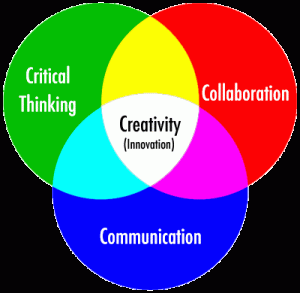The Top Four Workplace Skills for the 21st Century (Are Different Than You Might Think)
By Dave Blum

Have you ever wondered what the world might look like in 2050 (let alone 2020, 2030 or 2040)?
According to Yuval Noah Harari, author of 21st Lessons for the 21st Century, the only constant going forward is change, and we all better be ready for it.
For much of the last 50 years, according to Harari, the rule of thumb has been, “Learn Technical Skills!” But what do you do in a world where tech jobs are being outsourced at a record pace, and where AI (artificial intelligence) is rapidly co-opting areas we thought were reserved for humans alone? Think about it. What do we do when AI can write code better than any human being, or converse in a foreign language as well (or better) than any linguist? This day is coming.
Harari’s advice is simple: start focusing on evergreen, general-purpose life skills – sometimes referred to as the Four C’s:
- Critical Thinking
- Communication
- Collaboration
- Creativity
Who knew that my teambuilding business, Dr. Clue Treasure Hunts, would suddenly become so cutting edge—an expert purveyor of the most necessary, workplace skills! It turns out that as my teambuilding scavenger hunt participants run around the park, neighborhood or museum of their choice, solving clues and reaching mystery locations, they’re also actively practicing the Four C’s, in accelerated fashion. For example, during a hunt, you are…
- Solving clues and planning your course requires strong critical thinking skills.
- Creating and revising your team’s hunt strategy needs expert communication skills.
- Working together in a team—sharing resources, asking for and offering help – all requires sophisticated collaboration skills.
- Seeing the other teams as potential allies or partners, in the spirit of cross-team-cooperation, is an act of extreme creativity.
Harari goes on to conclude that, in an era of constant change and disruption, we will all need to cultivate three crucial abilities, namely:
- The ability to deal with change
- The ability to learn new things
- The ability to preserve your mental balance in unfamiliar situations
In the past, you could rightly assume that your area of study early in life (in college, in vocational school, in apprenticeship) would sustain you throughout your career. A lawyer or doctor retires as a lawyer or doctor. But what happens if AI starts to master the algorithms of law or medicine to such a degree that lawyers and doctors become redundant – not to mention computer coders or drone operators? If Harari is correct, we may soon be swapping out our jobs and careers every 10 years or so, as one industry recedes and new industries emerge. It’s a wild thought, isn’t it? And it’s happening already.
Our challenge, then, is to become extremely resilient to change…to keep learning, adapting, and pivoting, while somehow remaining sane and balanced in a topsy-turvy world.
In Harari’s words, we will “need not merely to invent new ideas and products but above all to reinvent [ourselves] again and again.
How ironic that activities like teambuilding scavenger hunts – often assumed to be mere team bonding exercises — may move into the foreground as critical training activities for the evolving workplace and the flexible worker!
For more thoughts on this article, here’s Dave Blum, President and Founder of Dr. Clue Teambuilding Scavenger Hunts

